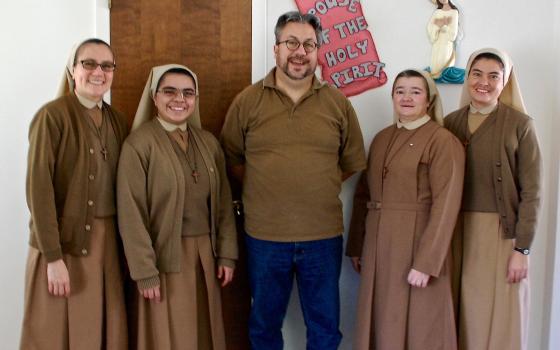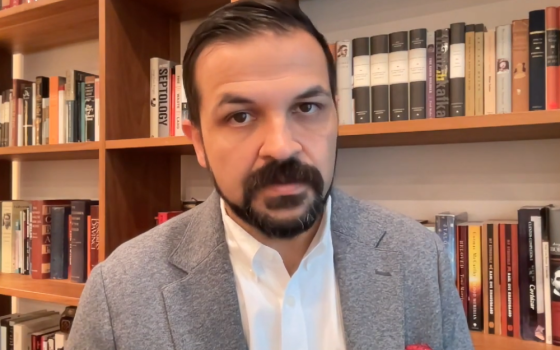A Palestinian holds a child Jan. 22, 2024, at Nasser Hospital in Khan Younis in the southern Gaza Strip who was wounded in an Israeli airstrike, amid the ongoing conflict between Israel and the Palestinian Islamist group Hamas. (OSV News photo/Ahmed Zakot, Reuters)
The situation in the Gaza Strip is "extremely catastrophic," and people are dying not only from violence but from preventable illnesses, said the CEO of the Latin Patriarchate of Jerusalem.
"People are really losing their life because of no treatment, no medical care," Sami El-Yousef, CEO, told OSV News Jan. 20. He repeatedly described the situation as "catastrophic" throughout the interview.
The supplies that are being allowed in are being transported from Egypt into southern Gaza Strip.
"There have been no supplies allowed into the northern part of Gaza," including Gaza City, where most Christians are sheltering in the Catholic and Orthodox parishes, El-Yousef said.
He said that during January, a black market has sprung up, and things such as medicine and blankets were being sold for 10 times the amount they sold for before Israel declared war on Hamas in retaliation for an Oct. 7 land and air attack launched by the militant Islamic group.
At the beginning of the war, a Gaza medical clinic run by the Catholic charitable agency Caritas transferred most of its medicine stock to Holy Family Catholic Parish, but all of those supplies are now depleted, El-Yousef said.
Of the approximately 800 Christians sheltering at the two parishes, seven have died "from medical neglect." One 35-year-old died when his appendix ruptured and he could not get to a hospital; the rest were elderly. At least five women over 80 have fallen and have injuries that prevent them from walking, he said. Five or six remain injured from a December sniper attack; their injuries do "not appear life-threatening … but they need treatment."
He spoke of one woman hit by shrapnel who was fortunate enough to have it removed -- under anesthesia -- at the Anglican hospital, but she had no pain medication for when the anesthesia wore off. The Washington Post reported Jan. 20 about one surgeon who had amputated his niece's leg on a kitchen table -- without anesthetics. The story said many doctors are performing surgeries without anesthesia or pain relief.
"I would consider our people to be lucky, compared to what the general population" of the Gaza Strip is enduring, El-Yousef said of the small Christian community.
Advertisement
Israel began a blockade of the Gaza Strip in 2007, after Hamas militarily took over the Gaza Strip.
El-Yousef said before the current Israel-Hamas war, Israel was allowing about 600 truckloads of aid into the territory. Now, he said, about 200 truckloads are allowed in each day, and Israeli soldiers search each truck multiple times so that nothing can be smuggled in to help Hamas. He said the list of prohibited items is growing; for instance, incubators and oxygen machines are forbidden.
The World Health Organization said in mid-January that of the 36 hospitals operating in Gaza before the war, only 17 remain functioning.
The Associated Press reported that, under a deal mediated by France and Qatar, a shipment of medicine for dozens of Israeli hostages held by Hamas arrived in Gaza Jan. 17. As part of that deal, for each box for the hostages, 1,000 boxes of medicine would be sent for Palestinians.
El-Yousef said the local Christian community wanted to conduct clothing and blanket drives for the Gaza Christian community -- when people fled to the church compounds in October, the weather was still warm -- but Israel is not allowing goods into Gaza.
The patriarchate is able to send money to the Christian community. El-Yousef acknowledged that money now sent for food and medicine would be used to purchase supplies from the black market.
"It's very painful, but what are the choices? People either starve to death or you pay for what you can get," he said.
"Money is not an issue and will never be an issue to sustain the lives of these people in Gaza," he added.






